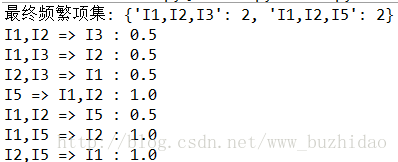'''
思路: 1、生成L1;
2、Ck生成Lk;
3、Lk生成Ck+1;
4、得到频繁项集;(前面只用到支持度);
5、通过频繁项集生成关联规则。(用到置信度).
'''
import collections
datasets = [
["I1","I2","I5"],
["I2","I4"],
["I2","I3"],
["I1","I2","I4"],
["I1","I3"],
["I2","I3"],
["I1","I3"],
["I1","I2","I3","I5"],
["I1","I2","I3"]
]
min_support = 2
min_confidence = 0.5
Lk_all = {}
def getdatasetsString():
result = []
for transation in datasets:
tmp = ""
for item in transation:
tmp+=item
if item != transation[-1]:
tmp += ","
result.append(tmp)
return result
def getL1():
tmp = []
L1 = {}
for transaction in datasets:
for item in transaction:
tmp.append(item)
rs = collections.Counter(tmp)
for key in sorted(rs):
if(rs[key] >= min_support):
L1[key] = rs[key]
return L1
def getLk(Ck):
Lk = {}
result = getdatasetsString()
for items in Ck:
tmpitems = items.split(",")
count = 0
for r in result:
flag = True
for item in tmpitems:
if item in r:
continue
else:
flag = False
break
if flag:
count = count + 1
if (count >= min_support):
Lk[items] = count
return Lk
def getCk1(Lk):
Ck= []
keys = list(Lk.keys())
keys1 = list(Lk.keys())
for key in keys:
keys1.remove(key)
for key1 in keys1:
key_last = key.split(",")[-1]
key1_last = key1.split(",")[-1]
key_pre = key.replace(key_last,"")
key1_pre = key1.replace(key1_last,"")
if( key_pre == key1_pre):
if (key_last>key1_last):
s = key_pre+key1_last+","+key_last
else:
s = key_pre+key_last+","+key1_last
subc = getSubString(s)
subl = getLk(subc)
if(len(subc) == len(subl)):
Ck.append(s)
return Ck;
def getFiallyLk(L1):
Lk = L1
while(True):
Ck1 = getCk1(Lk)
Lk1 = getLk(Ck1)
for key in Lk:
Lk_all[key] = Lk[key]
if (len(Lk1) == 0):
break
Lk = Lk1
return Lk
def getSubString(s):
substring = []
items = s.split(",")
for item in items:
if item == items[-1]:
substring.append(s.replace(","+item,""))
else:
substring.append(s.replace(item+",",""))
return substring
from itertools import combinations
try:
from functools import reduce
except ImportError:
pass
f = lambda s: reduce(list.__add__, (
list(map(list, combinations(s, l)))
for l in range(1, len(s))),
[])
def getRule(Lk):
rules = {}
for Lk_item in Lk:
items = Lk_item.split(",")
N = Lk[Lk_item]
pre_item_list = f(items)
for pre_item in pre_item_list:
back_item = sorted(list(set(items)^set(pre_item)) )
pre_s = ""
for item in pre_item:
if len(pre_item) == 1:
pre_s += item
else:
if item == pre_item[-1]:
pre_s += item
else:
pre_s += item + ","
back_s = ""
for item in back_item:
if len(back_item) == 1:
back_s += item
else:
if item == back_item[-1]:
back_s += item
else:
back_s += item + ","
N1 = Lk_all[pre_s]
p = N/N1
if(p >= min_confidence):
rule = pre_s+" => "+back_s
rules[rule] = p
return rules
if __name__ == "__main__":
L1 = getL1()
Lk = getFiallyLk(L1)
print("最终频繁项集:",Lk)
rules = getRule(Lk)
for rule in rules:
print(rule,":",rules[rule])
'''
C2 = getCk1(L1)
print("C2:",C2)
L2 = getLk(C2)
print("L2:",L2)
C3 = getCk1(L2)
print("C3:",C3)
L3 = getLk(C3)
print("L3:",L3)
'''
最终输出结果截图:

